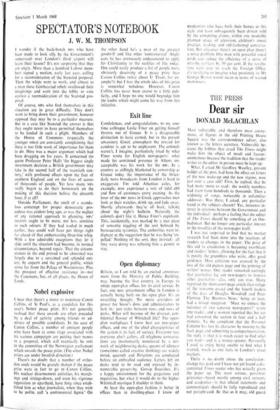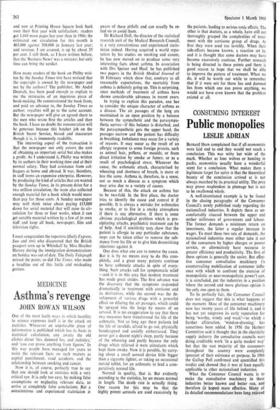Dear sir
THE PRESS DONALD McLACHLAN
Most vulnerable, and therefore most anony- mous, of figures in the old Printing. House Square was the correspondence editor, also known as the letters secretary. Vulnerable be- cause the lobbies that assail The Times might make him the object of insult and favour; anonymous because the tradition that the reader writes to the editor in person must be kept up.
What, I asked Mr Geoffrey Woolley, present holder of the post, had been the effect on letters of the new make-up and the new regime, now just over a year old? First, he replied, that he had many more to read: the weekly numbers had risen from hundreds to thousands. Then a widening of range, noticeable in unfamiliar addresses. Was there, I asked, any particular trend in the subjects chosen? Yes, immense in- terest in relations between the Government and the individual—perhaps a feeling that the editor of The Times should be something of an Om- budsman. But no longer any particular interest in the novelties of the newspaper itself.
I was not surprised to find that no market research had been done into the reactions of readers to changes in the paper. The price of this aid to circulation is becoming exorbitant and readers' letters, allowing for the fact that it is mostly the grumblers who write, offer good guidance. Most criticism was aroused by the loss of the old picture page and the printing of writers' names. One reader remarked cuttingly that journalists lay out newspapers to impress other journalists—alas, only too true. Many regretted the short court-page article (last refuge of the winsome essay) and the fourth leaders of the days of Douglas Woodruff and Peter Fleming. The 'Business News,' being an inset, had a mixed reception : 'Must we endure the nuisance of two separate newspapers?' wrote one reader, and a woman reported that her cat had consumed the section in four and a half minutes. To the complaint that the Personal Column has lost its character by moving to the back page and submitting to compartmentation, the reply is that it is much easier to find what you want—and is a money-spinner. Personally I used to enjoy being unable to find what 1 wanted, much as one feels in London's street markets.
There is no doubt about the conclusion: change has paid and I have not yet found a dis- contented Times reader who has actually given the paper up. The most serious, persistent grievance—heard mostly among civil servants and academics—is that official statements and communiqués should be fully reproduced and not paraphrased. Be that as it may, old guard
and new at Printing House Square look back over their first year with satisfaction: readers got 1,444 more pages last year than in 1966; the estimated ABC circulation for this month is 403,000 against 308,000 in January last year; and revenue, I am assured, is up by about 35 per cent. I still think, as I have written before, that the 'Business News' was a mistake; but only time can bring the verdict.
How many readers of the book on Philby writ- ten by the Sunday Times trio have noticed that the copyright is owned by the newspaper and not by the authors? The publisher, Mr Andrd Deutsch, has been good enough to explain to me the intricacies of an ingenious piece of book-making. He commissioned the book from, and paid an advance to, the Sunday Times as author; royalties will go to the same account. But the newspaper will give an agreed share to the men who wrote first the articles and then the book. I have no doubt the remuneration will be generous because this hatchet job on the British Secret Service, biased and inaccurate though it is, is immensely readable.
The interesting aspect of the transaction is that the newspaper not only covers the cost of obtaining an important serial but also makes a profit. As I understand it, Philby was written by its authors in their working time and at their normal salary. They had assistance from col- leagues at home and abroad. It was, therefore, in staff terms an expensive enterprise. However, by producing the kind of articles that are wanted by the Sunday Times, in its present drive for a two million circulation, the team also collected enough material for a book which would more than pay for those costs. A Sunday newspaper may well think twice about paying £15,000 down for serial material that will raise its cir- culation for three or four weeks, when it can get suitable material written by a few of its own staff and keep all book, newspaper, film and television rights.
I must congratulate the reporters (Daily Express, Sun and rrN) who discovered that the British passport torn up in Whitehall by Miss Heather Harvey during the immigration demonstrations on Sunday was out of date. The Daily Telegraph missed the point; so did The Times, who made a headline out of this futile and misleading gesture.



































 Previous page
Previous page